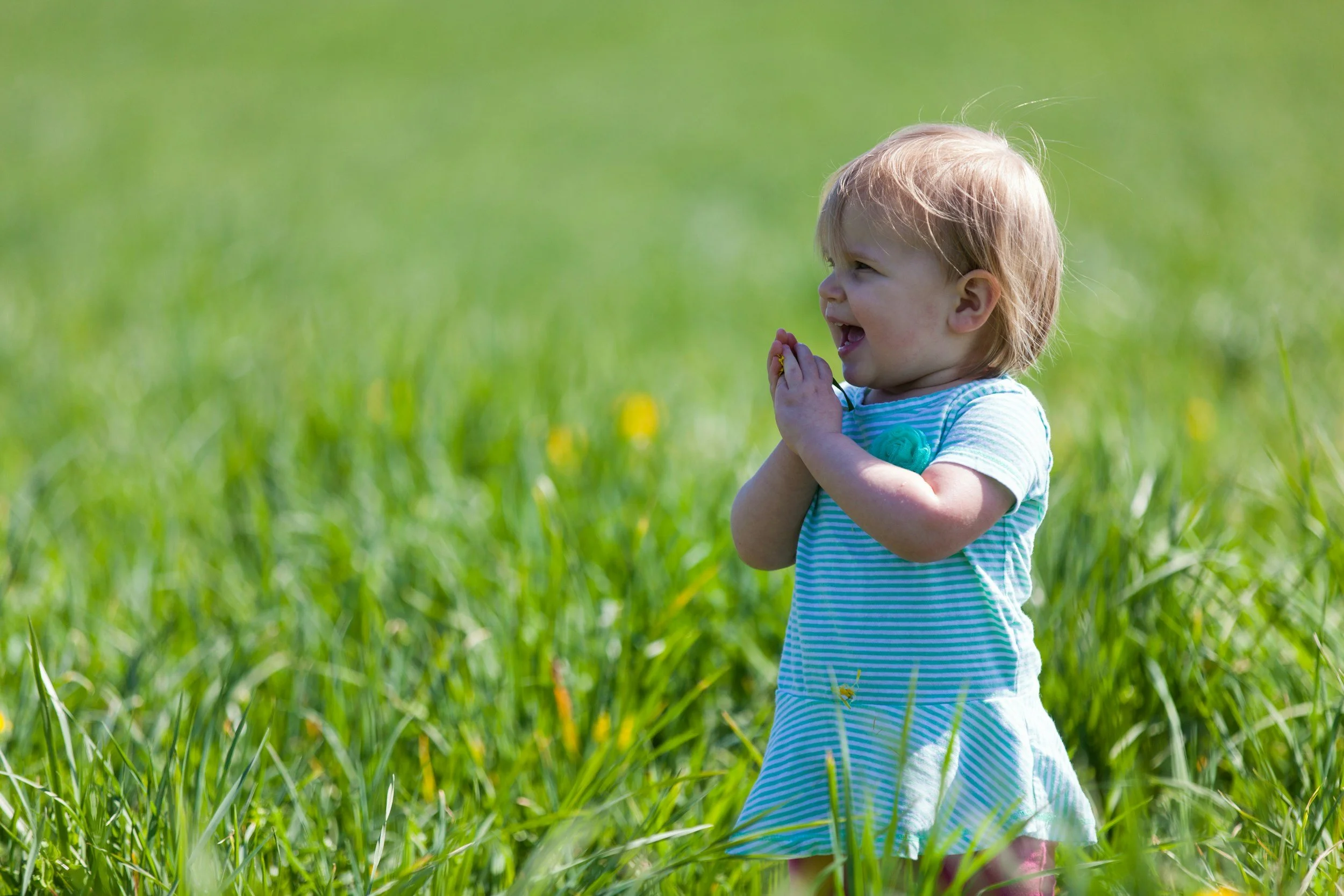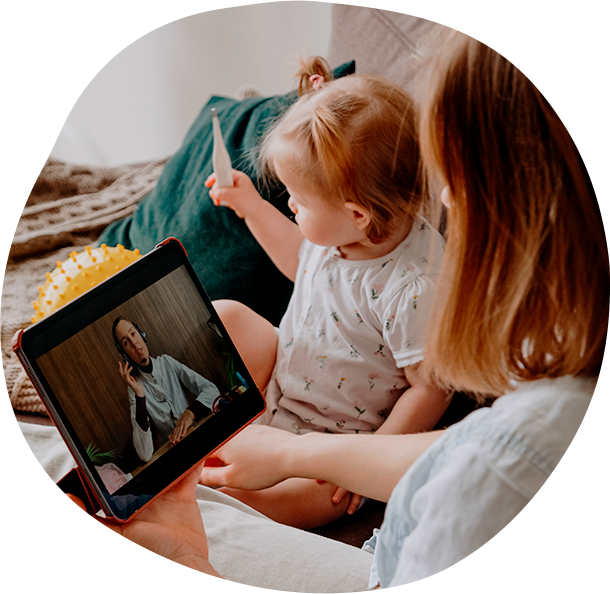Child Mental Health
Content membership
Find our entire child mental health curriculum here! Topics include development and play, behavioral and emotional health, and neurodivergence. Got a question? Text one of our Coaches at anytime!
-
-
Age Appropriate Play (0-12 Months)
For children, play isn't just for fun – it's a crucial part of development. Learn how to foster age-appropriate play in your daily routine for ages 0- 12 months.
For children, play isn't just for fun – it's a crucial part of development. Learn how to foster age-appropriate play in your daily routine for ages 0- 12 months.
-
Play Strategies
For children, play isn't just for fun – it's a crucial part of development. Learn how to foster age-appropriate play in your daily routine.
For children, play isn't just for fun – it's a crucial part of development. Learn how to foster age-appropriate play in your daily routine.
-
Play Therapy at Home
Playing is paramount in childhood. Children communicate through play in early childhood. If you want to know what your child is thinking about, watch how they play! Parents can play with their children in a way that fosters an environment ripe for brain development and learning. We’ll walk you through what you should (and should not) be doing during play time with your child. Spoiler alert... It’s simpler than you may imagine.
Playing is paramount in childhood. Children communicate through play in early childhood. If you want to know what your child is thinking about, watch how they play! Parents can play with their children in a way that fosters an environment ripe for brain development and learning. We’ll walk you through what you should (and should not) be doing during play time with your child. Spoiler alert... It’s simpler than you may imagine.
-
-
-
Brain Development, Memory & Language
Do all 4-year-olds ask this many questions? Should I schedule every minute of my 3-year-olds day? When will my child understand my perspective?! To answer these questions, we turn to neuroscience. We won’t take you all the way back to high school anatomy class, but we do want to equip you with knowledge about your child’s developing brain so you can set realistic expectations and understand how to foster an environment ripe for brain development.
Do all 4-year-olds ask this many questions? Should I schedule every minute of my 3-year-olds day? When will my child understand my perspective?! To answer these questions, we turn to neuroscience. We won’t take you all the way back to high school anatomy class, but we do want to equip you with knowledge about your child’s developing brain so you can set realistic expectations and understand how to foster an environment ripe for brain development.
-
Developmental Milestones
The pediatric checklists are great, but you want a cheat sheet to reference at home and between appointments (and you don't have time to read 5 books!). We break down the basics of child development, create realistic expectations and help you celebrate your child’s milestones!
The pediatric checklists are great, but you want a cheat sheet to reference at home and between appointments (and you don't have time to read 5 books!). We break down the basics of child development, create realistic expectations and help you celebrate your child’s milestones!
-
Functions of Behavior
Everything happens for a reason. While this cliche isn’t always true, it does have universal truth in the realm of behavior. Even in the most head-scratching of parental dilemma, your child has a reason behind their actions. We can understand why, increase the behaviors we want to see, and discourage the behaviors we don’t, with an understanding of the functions behind behavior.
Everything happens for a reason. While this cliche isn’t always true, it does have universal truth in the realm of behavior. Even in the most head-scratching of parental dilemma, your child has a reason behind their actions. We can understand why, increase the behaviors we want to see, and discourage the behaviors we don’t, with an understanding of the functions behind behavior.
-
-
-
Coping for Kids
Coping skills help us with the tough moments, the moments when you feel dysregulated and not like yourself. Even young children can begin to learn coping skills to help them navigate through challenges. And, perhaps more importantly, parents can teach and model coping skills for their children to set the stage for helpful coping throughout their life.
Coping skills help us with the tough moments, the moments when you feel dysregulated and not like yourself. Even young children can begin to learn coping skills to help them navigate through challenges. And, perhaps more importantly, parents can teach and model coping skills for their children to set the stage for helpful coping throughout their life.
-
Mental Health in Early Childhood
You want to consider and foster your child’s mental health from an early age, but don’t know exactly what that looks like. This is all new information! It may have never been modeled for you. What do you focus on? What do you look for? These are common questions whirling through parents’ minds. We’ll walk you through what you need to know about mental health and wellness in your 0-5 year old.
You want to consider and foster your child’s mental health from an early age, but don’t know exactly what that looks like. This is all new information! It may have never been modeled for you. What do you focus on? What do you look for? These are common questions whirling through parents’ minds. We’ll walk you through what you need to know about mental health and wellness in your 0-5 year old.
-
Riding the Wave of Emotion
Emotions in toddlerhood can arise suddenly like a big wave in the ocean. We’ll show you how to ride the wave of emotion to reach calmer and more predictable waters.
Emotions in toddlerhood can arise suddenly like a big wave in the ocean. We’ll show you how to ride the wave of emotion to reach calmer and more predictable waters.
-
Stress and Anxiety in Young Children
Toddlers and young children can and do experience anxiety, just like older children and adults. This guide explains what anxiety looks like in early childhood, and specific types of anxiety. You’ll learn how anxiety manifests physically in our bodies and cognitively in how it impacts how we think. We’ll help you understand when anxiety is normal and age-appropriate, and when your child may benefit from support from a mental health professional.
Toddlers and young children can and do experience anxiety, just like older children and adults. This guide explains what anxiety looks like in early childhood, and specific types of anxiety. You’ll learn how anxiety manifests physically in our bodies and cognitively in how it impacts how we think. We’ll help you understand when anxiety is normal and age-appropriate, and when your child may benefit from support from a mental health professional.
-
-
-
Attention-Deficit/Hyperactivity Disorder
Attention-deficit/hyperactivity disorder (ADHD) is related to the development of the frontal lobe and executive functioning system. Typically, ADHD impacts attention, impulsivity, and hyperactivity, though in varying severity. Symptoms are often present in childhood, and can persist through adulthood. It is one of the many conditions considered “neurodiverse,” and can look different child to child, even if they have the same diagnosis.
Attention-deficit/hyperactivity disorder (ADHD) is related to the development of the frontal lobe and executive functioning system. Typically, ADHD impacts attention, impulsivity, and hyperactivity, though in varying severity. Symptoms are often present in childhood, and can persist through adulthood. It is one of the many conditions considered “neurodiverse,” and can look different child to child, even if they have the same diagnosis.
-
Importance of Early Intervention
Many of the parenting books include developmental markers to look for in the rapidly changing period known as early childhood.These are helpful to provide reassurance, what to look for, and what to expect. However, it is also important to know that every child develops on their own individual timeline. This guide serves to explain what can be done if development is veering far off track from expected, and why the earlier the intervention the better in terms of your child’s growth and success.
Many of the parenting books include developmental markers to look for in the rapidly changing period known as early childhood.These are helpful to provide reassurance, what to look for, and what to expect. However, it is also important to know that every child develops on their own individual timeline. This guide serves to explain what can be done if development is veering far off track from expected, and why the earlier the intervention the better in terms of your child’s growth and success.
-
Neurodivergences - What does it all mean?
You may have seen the terms “neurodivergent” or “neurotypical” bandied about. With all of the information floating around about development, these terms may cause alarm or concern, but we are here to break it all down, and present an overview of what it all means.
You may have seen the terms “neurodivergent” or “neurotypical” bandied about. With all of the information floating around about development, these terms may cause alarm or concern, but we are here to break it all down, and present an overview of what it all means.
-
-
Parenting and Neurodiversity
If your child is wired a little differently, you may have some concerns that just aren’t covered in the parenting resources for neurotypical kids. Or, you may have a neurotypical child and a neurodivergent child, and you need parenting resources for all of your children. This guide will provide resources and information specific to parenting when neurodivergence is a factor.
If your child is wired a little differently, you may have some concerns that just aren’t covered in the parenting resources for neurotypical kids. Or, you may have a neurotypical child and a neurodivergent child, and you need parenting resources for all of your children. This guide will provide resources and information specific to parenting when neurodivergence is a factor.
-
Screening and Assessment Tools
If you have noticed that your child is developing differently than their peers, or you have concerns about their development, you may be wondering “What do I do now?” There are many different pathways to start to examine a child’s development, and it can be a confusing and somewhat counterintuitive path. Having a good understanding of what the professionals are looking for, and how they are gathering that information can help you maximize your time in a doctor or psychologist's office.
If you have noticed that your child is developing differently than their peers, or you have concerns about their development, you may be wondering “What do I do now?” There are many different pathways to start to examine a child’s development, and it can be a confusing and somewhat counterintuitive path. Having a good understanding of what the professionals are looking for, and how they are gathering that information can help you maximize your time in a doctor or psychologist's office.
-
What we offer
Our team of experts have distilled down the leading research into “no bull$#!* digital guides that get you the information you need without the fluff. Each guide will breakdown the topic, explain the science and then teach you how to implement in ~30 minutes or less…saving you hours of searching, trial and error. All of our guides can be reviewed on your time, at your own pace.
Time-saving guides
As part of your Learning Program, you’re paired 1-1 with a coach. Each of our coaches are deep content experts with years of doula and or nursing experience. They are prepared to support you as you apply the learnings in your home. You’ll meet with your coach regularly, and our coaches are also available on demand via text, phone or office hours.
One-on-one coaching
You get unlimited access to our network of vetted experts across adult mental health, infant/child mental health, sleep, nutrition and more. Your coach will assist in matching you with the right expert based on your family’s needs, schedule, and budget.
Expert access
Evidence-based
parenting support
It’s hard to know who to trust as a parent, and you don’t have time to do all of the research yourself. Good news - we’ve done the heavy lifting for you!
Our Learning Programs were carefully developed by a team of clinical experts using the latest evidence and research. We’re constantly updating our knowledge base to bring you the most cutting edge research!
-
Our parenting skills modules blend evidence-based research in child development, attachment theory, interpersonal neurobiology, and infant mental health to empower authentic and intuitive parenting approaches.
-
Recent research published by Harvard Graduate School of Education and the “Making Caring Common Project” shows that child and parent mental health are inextricably linked.
Our modules on Adult Mental Health take a compassionate approach, integrating attachment theory, interpersonal neurobiology, cognitive behavioral therapy (CBT), and polyvagal theory.
-
According to Pew Research, child mental health tops the list of parental concerns (above drugs, alcohol, gun violence, and bullying).
Our purpose-fit modules on child mental health empower parents with educational tools informed by leading psychological theories like Cognitive Behavioral Therapy (CBT), Filial Play Therapy, and Parent-Child Interaction Therapy (PCIT).
-
Our nutrition modules focus on easing parental stress around food and fostering sustainable, healthy eating habits that support the whole family biologically and emotionally, drawing from scientific literature on the Mediterranean diet, effects of added sugars, food as medicine, and healthy food relationships.
Meet our Expert Authors
Access members-only discounts
As a Triplemoon member, you’ll get exclusive offers to save with our partners!











